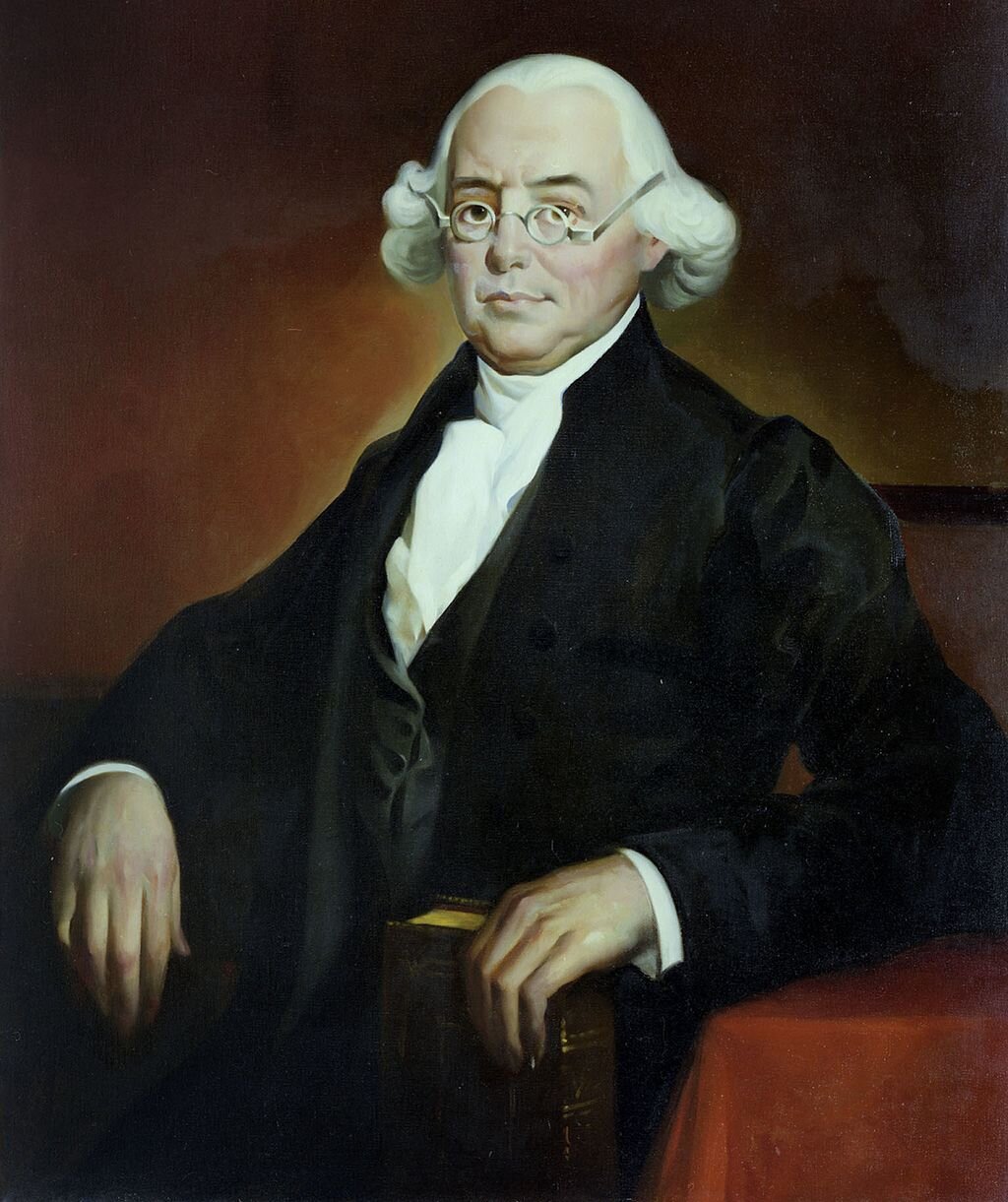
James Wilson
Pennsylvania
James Wilson was born on September 14, 1742 into a family of tenant farmers who lived near Cupar, Scotland. His father worked tirelessly, but the Scottish soil refused to yield large harvests. Hence, after the rent was paid, there was little left over to fill the family’s coffers. As well, the Wilson’s dwellings were cramped and lacked furnishings. Despite the meager resources, the young boy persevered in his pursuit of knowledge and became the philosophical foundation of the American Revolution.
Upon arriving at the University of St. Andrews, his studies focused on theology and other topics related to a life of service to the church. He completed his studies at St. Andrews in 1762. He also studied at the Universities of Edinburgh and Glasgow. He emigrated to America in 1766 and through references he brought from his homeland, Mr. Wilson began teaching Latin at the College of Philadelphia, which is now the University of Pennsylvania.
Certain writings reveal James Wilson was interested in more than theological training during his time in university. Interest in government and philosophy are mentioned. Shortly after he arrived in Philadelphia, through some key connections, he began reading law in the office of John Dickinson. Mr. Dickinson would play a major role in opposing independence from Great Britain. Mr. Wilson’s studiousness would be rewarded in 1767 when he was admitted to the Pennsylvania Bar.
In 1768, he contributed his first “block” to America’s philosophical foundation in response to the overreach of Parliament’s Stamp Act. Mr. Wilson’s treatise, Considerations on the Nature and Effect of the Legislative Authority of the British Parliament, argued that the colonies should be able to exercise dominion over itself equal to that of Parliament without that body’s intrusion. The treatise did affirm allegiance to the crown, but it denied the authority of Parliament in colonial matters. The 26-year-old’s essay would help provide the philosophical concept for natural rights and self-governance mentioned in the Declaration of Independence:
“All men are, by nature, equal and free: no one has a right to any authority over another without his consent: all lawful government is founded on the consent of those who are subject to it: such consent was given with a view to ensure and to increase the happiness of the governed, above what they could enjoy in an independent and unconnected state of nature.”
His beliefs in God and natural law provided the fuel for his philosophical fire. In another of his writings, the Presbyterian stressed that Congress was limited by natural law, and the Supreme Court can appeal to natural law to justify striking down a statute. Religious language is an unmistakable component of his writings. One scholar notes there are similarities between him and Thomas Aquinas. Another scholar pointed out, “Wilson was a convinced theist and bases the whole system of law on God, the Creator, an all-wise, and benevolent Providence of the universe.” He had the essay published in 1774. It was distributed widely in the colonies and in England.
On July 2, 1776, James Wilson joined Benjamin Franklin and John Morton in voting for independence.
As wise as he was in matters of governance, he was less so regarding financial management. Mr. Wilson sunk himself into great debt and compounded his troubles with reckless gambling. On a few occasions, he was almost arrested for his indebtedness. Another foolish choice he made was hoarding goods for the purpose of driving up prices for greater profits. He enraged Philadelphians to the point where he and 35 of his colleagues barricaded themselves in his house. Several people were killed or wounded in the fracas. Those in “Fort Wilson” were eventually rescued by law enforcement, but had to remain out of sight from the public for a time.
In July 1780, James Wilson provided legal counsel to Roger Morris for the formation of the Bank of North America. The bank was the first financial institution in the new world which issued its own currency and serviced loans. He also contributed significantly during the Constitutional Convention. According to James Madison’s notes, he contended earnestly for the House of Representatives to be comprised of the most legislators drawn from the people. He also argued that Senators be elected by the people. He failed to win this debate, but the compromise led to two senators and two electors from each state. For over a century, state legislatures elected its senators. In 1913, the XVII Amendment finally gave the power to elect senators to the people.
In 1789, President George Washington selected him to serve on the nation’s highest court. The selection turned out to be one of spectacle rather than success. Three years later, Associate Justice James Wilson speculated on land in New York and Pennsylvania. Expected returns did not materialize, and he found himself once again in great debt. With his finances in shambles, the justice was forced to serve time in debtors’ prison. Adding to his less than honorable service, he used his position in an attempt to have legislation passed in Pennsylvania that would benefit land speculation. All in all, he was almost impeached for his actions during his time on the high court.
In order to avoid serving more time in debtors’ prison, in 1797, Mr. Wilson moved from Philadelphia to Burlington, NJ. In the year 1798, he died in a state of great mental distress while presumably carrying out his federal circuit court responsibilities. He breathed his last on August 28, 1798, in the home of James Iredell, a fellow Supreme Court justice, in Edenton, NC.
James Wilson lived to be 56 years of age.


